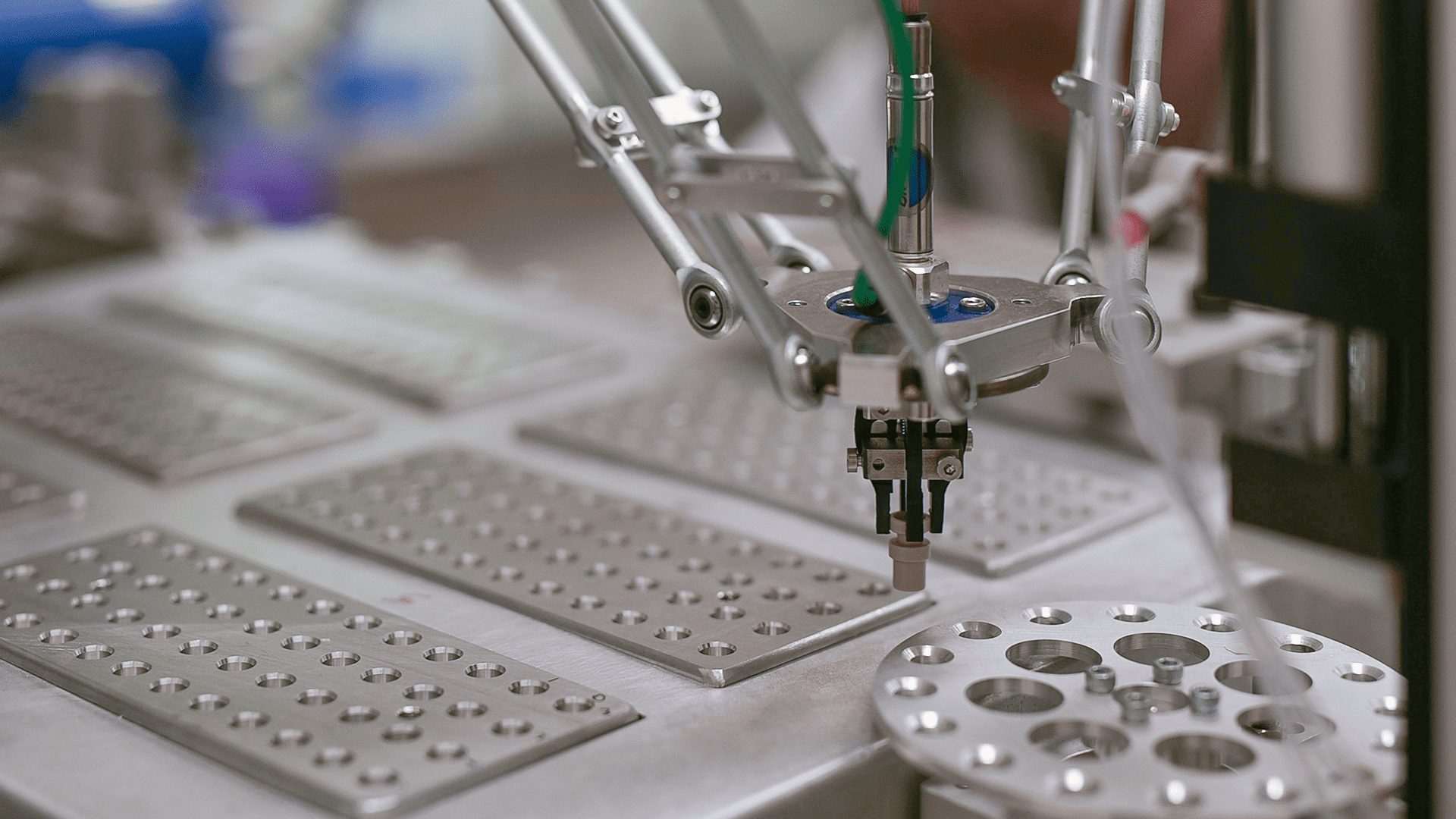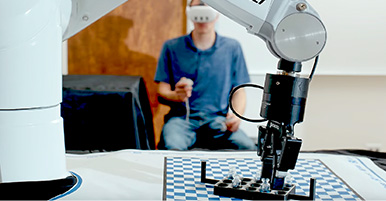Extension of SynFini synthetic chemistry platform could accelerate availability of
new treatments in pandemic and other emergency health situations
MENLO PARK, Calif. – October 6, 2020 – SRI International has been awarded $4.3 million from the Defense Advanced Research Projects Agency (DARPA) to create ProSyn™, an agile, rapidly deployable extension of SynFini™, SRI’s fully automated synthetic chemistry system. SRI will collaborate with Rutgers University’s Department of Chemical and Biological Engineering and Center for Structured Organic Particulate Systems (C-SOPS) to create and test ProSyn as a novel tool for the production of therapeutic small molecules needed for rapid response to biological threats and pandemics, such as COVID-19.
SRI’s SynFini platform is a fully automated synthetic chemistry system that designs and synthesizes chemical molecules. ProSyn will rapidly translate processes developed on SynFini to desired production levels, providing “just-in-time” and scalable manufacturing capacity. The Rutgers team led by Dr. Fernando J. Muzzio and Dr. Ravendra Singh will apply their expertise in process modelling to streamline the step from the laboratory to manufacturing-scale production.
SRI previously received funding under DARPA’s Make-It program that supported the development and evaluation of SynFini. Make-It was created to support new technologies that innovate molecular synthesis through automation, as a means to improve reproducibility and transferability of synthetic methods.
The COVID-19 pandemic has highlighted limitations in the production and delivery of the treatments necessary to respond to a worldwide public-health crisis. Predicting and stockpiling appropriate therapies prior to the outbreak of a novel virus is nearly impossible. As an extension of the SynFini system, ProSyn could reduce the need to stockpile antivirals and common intensive care-unit drugs and provide a more rapid response to emergency health situations, including new diseases.
“Throughout the COVID-19 pandemic, it has become overwhelmingly clear that there is a desperate need for technologies that can quickly discover therapeutics against new infectious diseases, and importantly, rapidly manufacture them at scale to make them broadly available,” said Nathan Collins, Ph.D., chief strategy officer of SRI’s Biosciences Division and the principal investigator for the ProSyn project. “With the addition of ProSyn, the SynFini suite may be able to address both needs. We are grateful to DARPA for recognizing this and subsequently supporting the ProSyn project, which could enable more effective response to pandemics such as COVID-19 and other biological threats.”
This material is based upon work supported by the Defense Advanced Research Projects Agency (DARPA), under Contract No. HR001119C0108.
Any opinions, findings and conclusions or recommendations expressed in this material are those of the author and do not necessarily represent the views of the Defense Advanced Research Projects Agency (DARPA).
About SRI International
SRI International, a non-profit research institute founded in 1946 and headquartered in Menlo Park, California, creates world-changing solutions to make people safer, healthier, and more productive. SRI Biosciences, a division of SRI International, integrates basic biomedical research with drug and diagnostics discovery, and preclinical and clinical development. SRI Biosciences has produced several marketed drugs and advanced more than 100 drugs to clinical trials. The division is focused on novel platforms and programs in a variety of therapeutic areas targeting high unmet medical needs. SRI Biosciences collaborates with a broad range of partners from small and virtual biotechnology companies to top 10 pharmaceutical companies and other leading industry partners. More information is available at www.sri.com.
About Rutgers University–New Brunswick and C-SOPS
Rutgers University–New Brunswick is where Rutgers, the State University of New Jersey, began more than 250 years ago. Ranked among the world’s top 60 universities, Rutgers’s flagship university is a leading public research institution and a member of the prestigious Association of American Universities. Rutgers School of Engineering’s Center for Structured Organic Particulate Systems (C-SOPS) brings together a cross-disciplinary team of researchers from major universities to work closely with industry leaders and regulatory authorities to improve the way pharmaceuticals, foods and agriculture products are manufactured. Founded in 2006, C-SOPS focuses on advancing the scientific foundation for the optimal design of SOPS with advanced functionality while developing the methodologies for their active control and manufacturing. More information is available at https://newbrunswick.rutgers.edu.
# # #
Media Contact:
Michele Parisi
mparisi@forwardhealthinc.com
+1 925 864 5028



